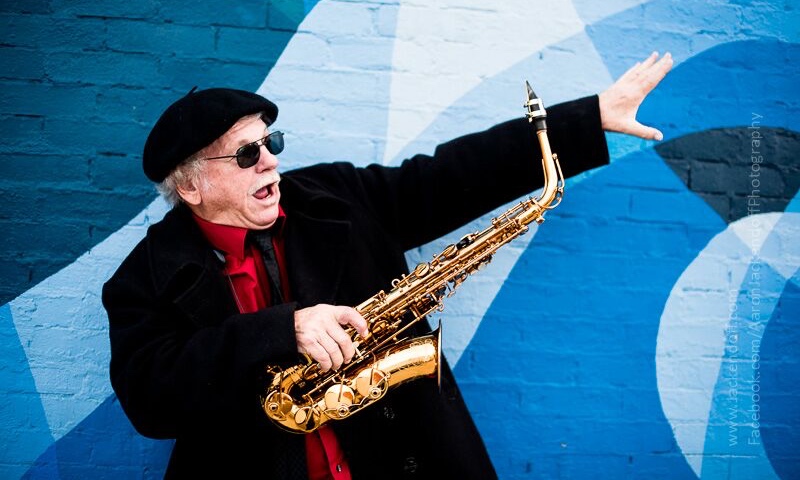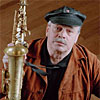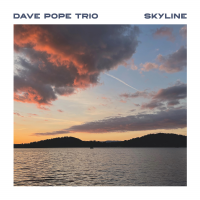Home » Jazz Articles » Interview » Richie Cole: Blue Collar Bebopper
Richie Cole: Blue Collar Bebopper

You don't have to understand anything to enjoy my music. All you have to do is feel it.
—Richie Cole
Richie Cole
saxophone, alto1948 - 2020
"I play for people," says Cole. "People are all the same. If they understand or want to understand jazz, I welcome them."
Recently, Richie Cole spent a few days in Charleston, South Carolina, winning over hundreds of new friends, with his friendly banter, off color jokes and high intensity alto solos. Among them was Charleston Mayor and occasional jazz pianist, John Tecklenburg, who presented Cole with the keys to the city and then dropped down to the club to sit in with the band.
But Cole seemed more at ease with the many curious locals, only marginally familiar with jazz, but attracted to his goodhearted humor and passionate music. To Cole, jazz is everyone's music.
"You don't have to understand anything to enjoy my music," says Cole. "All you have to do is feel it. People who never heard jazz before may like it, but not know the reason. If you like it, you like it."
Cole grew up in Trenton, New Jersey, where he first discovered his love for the alto and for jazz. Down Beat magazine offered him a full scholarship to Berklee School of Music in 1966. He replaced

Art Pepper
saxophone, alto1925 - 1982

Buddy Rich
drums1917 - 1987
Soon after leaving Rich's band, he set out on his own to launch a highly successful reputation as a searing alto soloist in the

Phil Woods
saxophone, alto1931 - 2015
For several years he co-led a band with legendary vocalist,

Eddie Jefferson
vocals1918 - 1979
Cole continued to record prodigiously and began to focus more on writing and arranging for a group that he calls the Alto Madness Orchestra (AMO) -a kind of informal franchise of bands and arrangements spread around the country.
Although indelibly identified with Trenton, New Jersey, he has since happily settled down in Pittsburgh, Pennsylvania.
While Cole may be easily characterized as a straight ahead player, a closer look reveals a more fleshed out identity. Where a lot of jazz musicians survive on the financial support of the rich and famous, Cole has been there and done that and he has no desire to go back. He is best described as a mischievous, blue collar bebopper.
Cole will throw out some salty language in that gravelly, cigarette stained voice of his, play songs that would suit the folks at the bar more than the tuxedo and gown crowd. He offhandedly creates a kinship with his audience that would convince a Johnny Cash fan to embrace

Charlie Parker
saxophone, alto1920 - 1955
"Most people are ignorant about jazz," explained Cole. "That's why I like to play stuff they will understand and then sneak in something to educate them. I will play something simple like 'Somewhere Under The Rainbow' or 'Danny Boy' and that catches their ear."
"I try not to be too technical all at once," he continued, "because that can confuse people. But I play what I really want to play—I don't compromise at all. Sometimes I'll play something really corny—because I consider myself the great white man of corn! That's part of the many minds of Richie Cole." The Many Minds of Richie Cole is also his latest CD, and it includes, of all things, "YMCA," with his Alto Madness Orchestra (AMO).
"YMCA"? Really?
"It's one of my many minds," affirms Cole. "All my life I've been navigating between serious jazz and show biz. I like humor. I like the feeling. I like disco. Not everything has to be centered around jazz. My life isn't geared around everything jazz."
"

Sonny Rollins
saxophoneb.1930
"I did the same thing with Frankie Avalon's "Venus." It's a beautiful song and the chart came out pretty good and I played my heart out. Even when I play something corny, I'm playing serious."
That doesn't mean that he doesn't want to be accepted as a jazz musician.
"I'm proud of it. I love the music and I work very hard to do this. I studied my trade. I started when I was 10 and immediately started taking lessons. I used to practice eight hours a day. I am as serious as a heart attack when it comes to playing."
AMO has been Cole's treasured invention. It is a culmination of years of experience in big bands combined with a real joy for extended romping solos. It is a small group with a big band sound. For Cole, it is the best of both worlds.
"I grew up in the big band era you know?" explained Cole. "I always liked the sound of the big band, but I didn't want to deal with all those musicians, so I figured out a way to get the sound with one trumpet, one trombone and two saxophones and I create voicings that get very close to a big band sound."
"I left the

Buddy Rich
drums1917 - 1987
"My first recording of the orchestra was 1991 called Trenton Style Presenting the Alto Madness Orchestra. I've been doing it every day ever since. I can't stop writing. Even when I am watching TV I'm writing."
AMO is more than just a band that Cole leads. It's also kind of a franchise.
"I meet different guys who are interested in different parts of the country." Cole explained. "If they are interested in starting one of my orchestras, I keep sending them charts. I just got back from Madison, Wisconsin and we did a concert at the Madison Opera House. We have one in San Antonio, Las Vegas, Los Angeles, Charleston, Chicago, Trenton and of course Pittsburgh."
Fifty years of recording and touring and performing in concerts, festivals and clubs all over the world has allowed Cole to establish himself enough to allow him to be a full time musician.
"For me, success is working the jobs you want to do and making enough money to be happy. My life has never been geared to making a lot of money. I don't need a lot of money. I'm very happy for some chump change in my pocket. I never cared about being famous or rich. I just wanted to play the music. Any fame came without me really wanting it," declared Cole.
In fact, he did briefly lead a life of leisure when he was living with actress Brenda Vaccaro, where his next door neighbor was Sammy Davis, Jr.
"It wasn't for me. They are not my kind of people. People in Pittsburgh are my kind of people. I had it made there, but I walked away from it." "I personally find the jazz life glorious, but it's not always easy being an entertainer and artist. There is a lot of rejection and disappointment. But I wouldn't have changed anything. Popularity is a fleeting moment."
Perhaps the most enduring and important relationship in Cole's life was legendary jazz vocalist,

Eddie Jefferson
vocals1918 - 1979
"Eddie had heard about me and he was following me around. We were at the St. James Infirmary club and they hired Eddie and he called me. And it was like we had played together forever. Soon after we played at the Tin Palace in New York and Harold's House of Jazz in Washington, DC. He then hooked me up with Muse records and we recorded together."
"It was like we were born for each other on and off the stage. He was the older black guy and I was the young white boy. We couldn't be more different, but it was as if we were sharing each other's brains."
"Jefferson was a poet. He came up with a style of vocalese where he would take a solo and put words to each note and create an incredible story. That's some genius shit there. He was a one of a kind guy. He had his own sound. He had a jazz voice."
Even as he nears the age of 70, Cole never seems to rest. He is always writing, playing, touring. He has plenty of plans for the future.
"I'm finishing up the Latin Lover CD. I'm doing an album with vocalist Carey Jefferson (Eddie Jefferson's nephew). My next project is a tribute to

Cannonball Adderley
saxophone1928 - 1975

Reggie Watkins
tromboneb.1971
"I am also working on a tribute to Eddie Jefferson. And we want to do something with the Alto Madness Orchestra dedicated to Richie's Angels—all ladies that help me with shopping and driving and watering my plants in my apartment when I'm away."
"I love Pittsburgh. It's my last stop. It is a music town and a beautiful town. It is the San Francisco of the East. I have so many good friends there and they really take care of me."
Brief Comments On Other Musicians:

Tom Waits
piano and vocalsb.1949

Pete Christlieb
saxophoneb.1945
Buddy Rich: World's greatest big band drummer.

Ornette Coleman
saxophone, alto1930 - 2015
Phil Woods: A master and good friend. He helped me a lot when I was a kid.
David Sandborn: I told him I'm really proud of you. You have done more to make the saxophone popular than any other musician in history.

Hank Crawford
saxophone, alto1934 - 2009
Sonny Rollins: My favorite musician period. He is the ultimate story teller. He's got the brains, technique, sound, personality. My biggest influence.

Thad Jones
trumpet1923 - 1986

Paul Desmond
saxophone, alto1924 - 1977

Kenny G
saxophone, sopranob.1956

Sal Nistico
saxophone1948 - 1991
" data-original-title="" title="">Boots Randolph: The first person people who don't know about jazz think about when you say saxophone is Boots Randolph. He does a solo version of "Body and Soul" that will break your heart. And the Yakkety Sax thing is difficult to play.
Art Pepper: He was the cool school of L.A. I always liked him and

Chet Baker
trumpet and vocals1929 - 1988

Eric Kloss
woodwindsb.1949
Roland Kirk: He was a one man band. Against all odds, look what he did.
Cannonball Adderley: My favorite alto player. I love everything about him. I got to know him a little bit. A fantastic man. What a sweetheart.
Photo credit: Aaron Jackendoff
Tags
Interview
Richie Cole
Rob Rosenblum
United States
Charlie Parker
Sonny Rollins
Buddy Rich
Eddie Jefferson
Carey Jefferson
Cannonball Adderley
Reggie Watkins
Tom Waits
Pete Christlieb
Ornette Coleman
Phil Woods
David Sandborn
Hank Crawford
Thad Jones
Paul Desmond
Kenny G
Art Pepper
Eric Kloss
Roland Kirk
Charleston
Trenton
YMCA
Alto Madness Orchestra
Richie Cole and the Alto Madness Orchestra
Comments
PREVIOUS / NEXT
Support All About Jazz
 All About Jazz has been a pillar of jazz since 1995, championing it as an art form and, more importantly, supporting the musicians who make it. Our enduring commitment has made "AAJ" one of the most culturally important websites of its kind, read by hundreds of thousands of fans, musicians and industry figures every month.
All About Jazz has been a pillar of jazz since 1995, championing it as an art form and, more importantly, supporting the musicians who make it. Our enduring commitment has made "AAJ" one of the most culturally important websites of its kind, read by hundreds of thousands of fans, musicians and industry figures every month.






 Buy Now
Buy Now



















